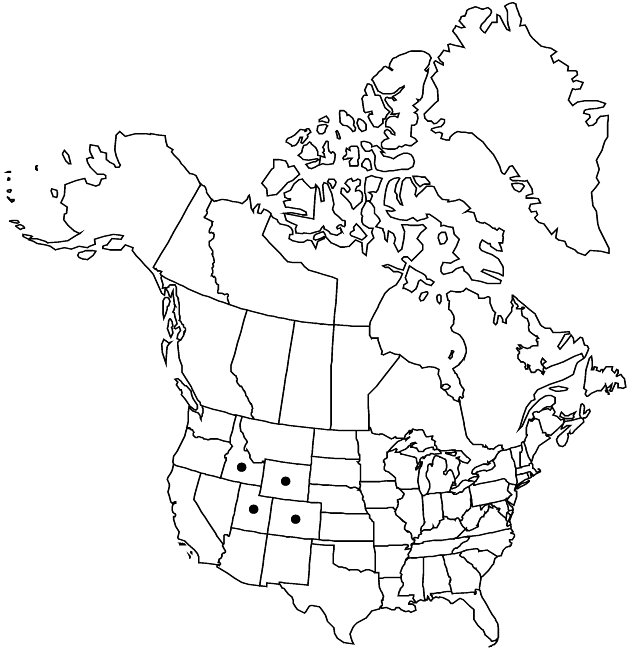Erigeron engelmannii
Bull. Torrey Bot. Club 26: 247. 1899.
Perennials, 3–20 (–30) cm; taprooted, caudex branches relatively short and thick. Stems erect, loosely to closely, sparsely to moderately strigose (hairs 0.1–0.9 mm), usually minutely glandular (glands barely evident), sometimes eglandular. Leaves basal (usually persistent) and cauline (petioles prominently ciliate at least on proximal portions, hairs spreading, thick-based); basal blades linear-oblanceolate, 20–100 × 1–4 mm, margins entire, faces strigose, eglandular; cauline usually restricted to proximal 1/2 of stems, slightly reduced distally. Heads 1 (–3). Involucres 3.5–5 (–6) × 7–12 mm. Phyllaries in 2–3 (–4) series, coarsely hirsuto-villous, sparsely to moderately minutely glandular. Ray-florets (35–) 45–100; corollas white, sometimes pink or bluish, 5–10 mm, laminae (0.8–1.1 mm wide) primarily reflexing, sometimes also weakly coiling at the tips. Disc corollas (2.5–) 2.7–4.2 mm (throats indurate and inflated, densely puberulent). Cypselae 1.4–1.8 mm (oblong), 2-nerved, faces sparsely strigose; pappi: outer usually of narrow scales, sometimes 0 or of setae, inner of 12–20 bristles.
Phenology: Flowering (Apr–)May–Jul.
Habitat: Dry, sandy or rocky sites, prairies, often with sagebrush, rabbitbrush, juniper, pinyon-juniper, salt desert shrub
Elevation: 1300–2500 m
Distribution

Colo., Idaho, Utah, Wyo.
Discussion
Plants from Chaffee and Fremont counties, Colorado, have strigose leaves and the compact habit of Erigeron engelmannii but sparsely spreading-hirsute stems; they may be intermediate between E. engelmannii and E. concinnus. Unusual variation in the pappi of E. engelmannii also suggests that the species needs study and better definition.
A. Cronquist observed that “Erigeron engelmannii intergrades completely with E. pumilus, yet has two geographic subspecies of its own, and shows no distributional similarity to the [taxa] of E. pumilus,” and that E. engelmannii is “smaller and more delicate, with shorter finer hairs, and [has] smaller heads with usually fewer ligules.”
Selected References
None.